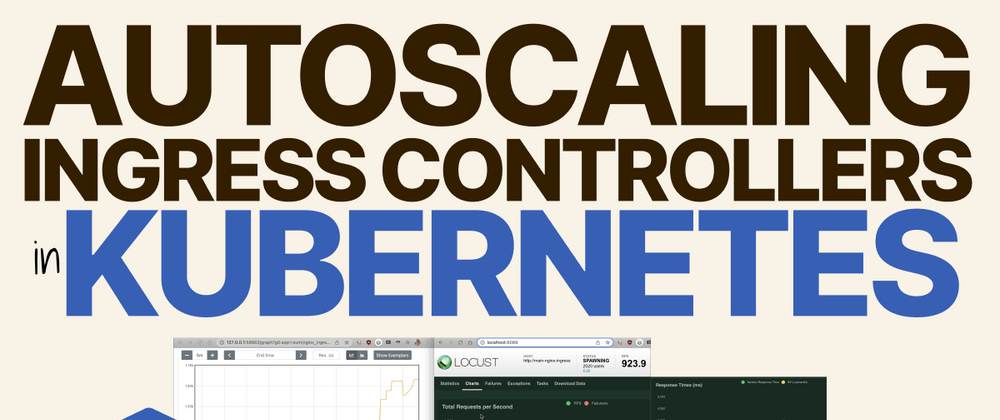
How do you deal with peaks of traffic in Kubernetes?
To autoscale the Ingress controller based on incoming requests, you need the following:
Me...
For further actions, you may consider blocking this person and/or reporting abuse


Autoscaling Ingress Controllers in Kubernetes allows dynamic scaling of Ingress controller instances based on traffic demand, ensuring efficient routing of external traffic to services. By using Horizontal Pod Autoscaler (HPA) and Cluster Autoscaler, Kubernetes can automatically adjust the number of replicas to meet resource needs. This approach helps maintain high availability and optimal performance for services, like those hosted on 104fashionmag.com/ even during fluctuating traffic loads.
I really liked how the piece explained autoscaling Ingress controllers in Kubernetes, because it’s one of those technical topics that can seem intimidating but makes a huge difference in real-world performance. Having the ability to automatically scale based on traffic spikes not only keeps apps reliable but also optimizes resources so you’re not over-provisioning. It’s almost like playing Serpiente de Google 2025, where you need to react quickly to the changing pace and adjust your strategy on the fly to keep moving forward smoothly. Do you think autoscaling will eventually become the default expectation for all Kubernetes setups rather than something teams have to configure separately?
I really liked how you explained autoscaling Ingress controllers in Kubernetes—it can feel like a very technical topic, but the way you broke it down made the benefits of flexibility and efficiency clear. It’s impressive how autoscaling helps balance traffic loads so apps stay responsive, which feels a bit like how PlayPelis APK manages to deliver smooth streaming even when lots of users are online at once. Do you think autoscaling will eventually become the default setup for most Kubernetes deployments?
Thank you very much for the excellent information you provide. In the future, I hope you will continue to provide everyone with as many fantastic blogs as possible. fireboy and watergirl
This is a solid approach to handling traffic spikes in Kubernetes. Exposing mapquest driving directions Prometheus metrics from the Ingress controller and using them with HPA or KEDA is a smart, scalable solution. Great breakdown! 🚀
This is super helpful for handling traffic spikes! It reminds me of needing to have fast reflexes, almost like a spacebar game competition to keep up. Definitely saving this for later reference.
Great post! Autoscaling the Ingress controller is often overlooked, but it’s crucial for handling quordle puzzles traffic spikes efficiently. Exposing Prometheus metrics from nginx-ingress and tying them into an HPA or custom scaler setup makes a big difference. Would love to see a full example with Prometheus + KEDA or HPA in action! 🚀
Autoscaling Ingress controllers in Kubernetes is a smart way to handle fluctuating traffic efficiently without manual intervention. By automatically adjusting the number of controller pods based on metrics like CPU usage or request rates, your cluster stays responsive during spikes and saves resources when traffic is low. It’s similar to how apps like Magis TV APK scale streaming quality based on your internet speed, ensuring smooth playback without wasting bandwidth. Have you experimented with any specific autoscaling tools or configurations in your Kubernetes setup?
Thank you for sharing such a clear explanation about Autoscaling Ingress controllers in Kubernetes. This really helped me understand how scaling improves traffic handling and overall system reliability. Read this article for more insights. Crossy Road Unblocked is a fun option where you can play free browser games.
Autoscaling Ingress controllers in Kubernetes is such a powerful concept—it’s impressive how it can dynamically adjust to traffic loads and ensure high availability without manual intervention. It really emphasizes the strength of Kubernetes’ orchestration and how modern infrastructure is shifting toward smart, self-managing systems. In a similar way, systems like Tarjeton IMSS automate and streamline access to health services, adapting to users’ needs efficiently. Have you explored how horizontal pod autoscaling or custom metrics can fine-tune your Ingress controller’s performance?
In the realm of cloud services, understanding northteksolar and breaking down your costs can be complex yet essential for effective budgeting and resource allocation.
These characteristics add to the game's great replay Snow Rider 3D value and widespread appeal, particularly among casual players seeking a fun and short challenge.
La opción de calcular edad por rut es genial para validar datos de forma rápida.
Grow A Garden Roblox adds a fun twist to farming — perfect for fans of Roblox meme games and social chaos.
It took me a little while to read all of the comments, but I found the article to be quite intriguing. merge fellas
fill this syntex ringz the link is
I prefer using the online fesco bill system because it's fast and hassle-free.
The solution using solitaire bliss is really innovative and effective for traffic management.
I applied these methods to develop this website for fnf . it works great!
Autoscaling it means adjusting the number of replicas based on traffic or resource usage to maintain performance Geometry Dash Lite and availability.